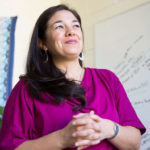By Maggie Kuo
Science, Sep. 8, 2016 —

Zoran Zeremski/iStockphoto
Finding a satisfying career path requires knowing what matters to you. Many of the factors that job seekers consider go beyond the specifics of the work they’ll be conducting, a survey published last week shows—and that’s how it should be, the study authors say.
Geographic location, working conditions, intellectual challenge, salary and benefits, and job security were the top considerations among the 3669 early and midcareer science, engineering, and social sciences Ph.D. recipients who participated in the survey.
These results may not come as a surprise to readers who have already thought about their job search, but among many job-hunting trainees, “it’s kind of taboo to talk about” the nonscientific factors that play into choosing a job, says study lead author Rebekah Layton, a program director in the Office of Graduate Education at the University of North Carolina, Chapel Hill. Despite the stigma, she adds, “those [factors] are OK and important to take into the decision making.”
To appropriately consider these factors, trainees have to get as much information about career paths as they can. Talking to people who have already established their careers is key to making an informed decision, says Thomas Magaldi, a professional development adviser at Memorial Sloan Kettering Cancer Center in New York City. These conversations can help trainees better understand the tasks and responsibilities associated with different roles so that they don’t make decisions based on assumptions and impulse reactions, he explains. It would be a mistake, for example, to pursue a consulting job solely for its high salary or to decide against staying in academia based on the impression that it would be a continuation of bench work. “That’s where people get into trouble,” he says.
Ph.D. students should also start thinking about their career plans early on, says Cynthia Fuhrmann, assistant dean of career and professional development at the University of Massachusetts Medical School in Worcester. Doing so will help them be more deliberate about their career decisions.
Following the traditional path of doing a postdoc, for instance, might be the right step for some, Furhmann says, but trainees should know that “there is no default step.”
Regardless of the types of jobs they’re considering, recent graduates should think about their first post-Ph.D. job as “a strategic move for their career advancement.”
Sticking to a planning timeline is also important, particularly for those pursuing faculty positions, Magaldi notes. If trainees realize that they are not meeting their benchmarks, they should re-evaluate their goals and consider other career options, he says. If “you just keep moving the goalpost, that’s not going to be a recipe for happiness and success.”
Better mentoring could help support career development too. Faculty adviser influence was a significant factor when choosing an academic career for respondents of nonminority backgrounds, but not for underrepresented minority (URM) Ph.D.s, the researchers found in their study. The number of URM respondents was too small to conclude that faculty advisers had no impact on their decisions about whether to pursue academic careers, but even so, Layton says, improved mentoring approaches may help keep URM Ph.D.s who are interested in academia on that path. In addition, for both respondents who stayed in academia and those who left, faculty and peer influences were the least cited reasons for picking a job. Mentoring doesn’t seem to be a major influence in career decisions for the majority of trainees, Layton says, so there could be an opportunity for it to play a greater role.
Finally, all the respondents noted that the ability to choose geographic location and working conditions such as work-life balance are important in their job choices. If these factors are important to everyone, Layton says, the scientific community needs to think about how to leverage them so that an academic career remains “an attractive choice to people we want to keep in the field.”











